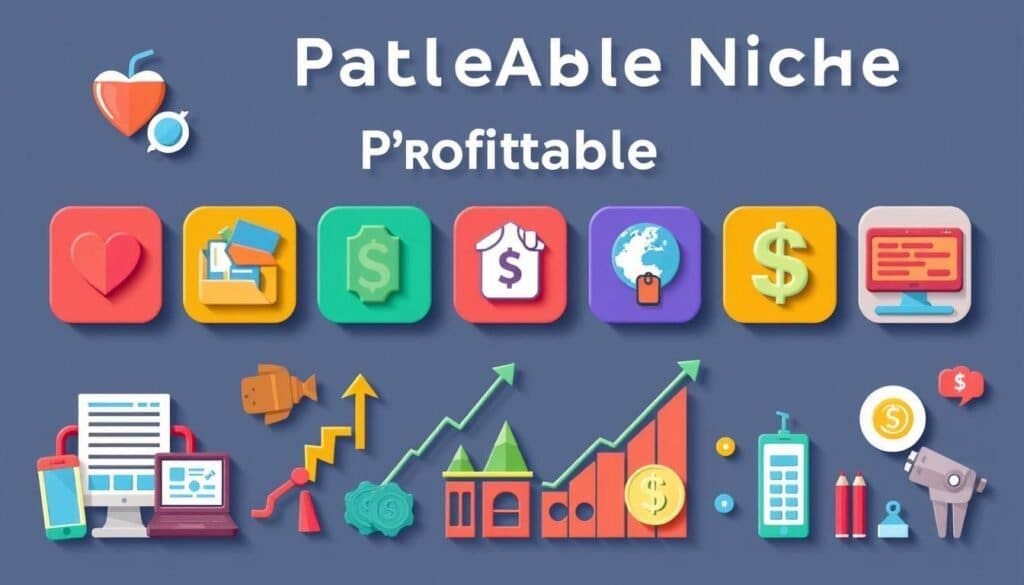Ever wondered why some bloggers make money easily while others don't? Starting a affiliate marketing blog is not just luck. It's about making smart choices and planning well.
Affiliate marketing is a great way to make money from your blog today. With the right steps, you could earn enough to quit your job. This article will guide you from the start to success in this competitive field. We'll talk about picking your niche, creating SEO-friendly content, and more. You'll find tips that match your interests and help you sell more1.
Key Takeaways
- Affiliate marketing can lead to a lucrative income, with bloggers averaging between $30,000–$50,000 per year2.
- Choosing a niche that aligns with your passion can enhance your success in affiliate blogging1.
- Implementing successful SEO strategies can take around three to six months to see tangible results2.
- Building a strong email list is critical, as many successful affiliate marketers rely on their subscribers for income2.
- Effective affiliate link placement can significantly improve click-through rates, highlighting the need for a good strategy1.
Introduction to Affiliate Marketing Blogging
Starting a blog can be thrilling and a bit scary. I always wondered how people make money online. I found out that learning about affiliate marketing could be the answer. It lets people earn money by sharing links and promoting products.
This mix of creating content and promoting products is great. It's a chance for anyone to make money by sharing what they love. They can reach more people and share their knowledge.
In the world of affiliate marketing, there's a lot of money to be made. In 2022, businesses spent $8.2 billion on it in the U.S. By 2024, this number is expected to jump to $15.7 billion3. Many bloggers are diving into affiliate marketing to make more money. They want to match their content with profitable partnerships.
Most affiliate programs need bloggers to have a website or blog. This shows they're experts in their field4.
By joining affiliate programs, bloggers can earn different amounts based on the product. For example, the Amazon affiliate program offers 1% to 4.5% in commissions. Some direct partnerships, like in golf, can give up to 20% in commissions5. These chances not only help bloggers create more content but also attract more visitors.
It's key for bloggers to know where their traffic comes from. Google Analytics is a great tool for tracking this. It shows how important it is to understand your audience to do better4.
This knowledge leads to making better content. Content that includes affiliate products in a natural way. It makes the blog better and can increase earnings.
Why Affiliate Marketing is a Profitable Venture
Affiliate marketing is becoming a popular way to earn money online. It attracts people who want to make their own way in the digital world. In the US, businesses spent $8.2 billion on affiliate marketing last year, a 76% increase in six years6. This growth shows how profitable and important affiliate marketing is becoming.
Starting in affiliate marketing is easy. You don't need a lot of money to begin. You can promote products without worrying about inventory or customer service. Affiliates can earn between $3,000 and $6,000 a month, which is $36,000 to $72,000 a year6. This shows that it's a good way to make money without spending a lot.
Commission rates for affiliate sales vary. Low-priced items might offer 5% commission, while high-ticket items can offer over 20%7. This means affiliates can pick products that fit their expertise and interests, increasing their earnings.
Many affiliates can earn $1,000 a month by promoting links on social media7. This income is attractive, and affiliates can build a lasting business by focusing on a niche. As they gain experience, they can earn more by negotiating better commissions and working with bigger brands.
Affiliate marketing is a great model because marketers get paid for the traffic and sales they bring. It lets content creators make money and build a community around shared interests. The top 1% of affiliate marketers can make tens of thousands to hundreds of thousands of dollars a month, showing the huge earning possibilities6.
How to Start a Successful Affiliate Marketing Blog
Starting an affiliate marketing blog can be a great way to make money online. It needs careful planning and execution. I started because I wanted to earn through my passions. Have you thought about how affiliate marketing can grow your small business?
First, pick a niche that interests you and meets audience demand. Platforms like Amazon Associates and Awin are good for making money. Remember, 31% of U.S. publishers say affiliate marketing is a top revenue source8.
Next, choose a reliable blogging platform. WordPress is popular for bloggers because it offers key features9. The right platform boosts your blog's chances of success.
Creating quality content is key to attracting visitors. Use formats like reviews and guides to engage your audience. Publishers of all sizes have found success in affiliate marketing9. Plus, over 80 percent of advertisers have affiliate programs9.
User experience is also important. A good design keeps visitors interested. Research shows 88 percent of visitors are less likely to return after a bad experience9.
Check the cookie duration of affiliate programs to understand your earnings. Knowing your options is key for success. Companies like impact.com offer higher commissions than Amazon Associates9.
Setting SMART goals and planning your content helps you succeed. Now, you have the basics to start your affiliate marketing journey with confidence.
Choosing the Right Niche for Your Blog
Choosing the right niche is key to success in affiliate marketing. I pick a niche that I'm passionate about. This keeps me motivated and helps me create engaging content. A good niche has wide appeal, lots of searches, and top-notch affiliate programs.
Knowing what makes a niche profitable is vital. It shapes my blogging path. So, I dive deep into researching affiliate blogging niches.
Characteristics of a Profitable Niche
I look for certain signs that a niche is profitable. A niche with growing trends usually draws a big audience. About 75% of a blog's income can come from affiliate articles10.
It's also key to find niches with good affiliate programs. These can offer set prices or a percentage of sales10. I check if the products will sell well. And I look at how competitive the niche is to boost my SEO.
How to Research Your Niche
Effective niche research is a must for my affiliate blogging. I study traffic trends, competitor success, and affiliate program availability. Google Trends and forums help me find popular topics and questions11.
Platforms like Reddit and Quora give me insights into what customers want11. Tools like Skimlinks show if an affiliate program is worth my time10. Knowing my niche well helps me build trust with my audience. This lets me create unique content that shines in a crowded space.

Selecting the Best Blogging Platform
Choosing the right blogging platform is key for affiliate marketing success. When I started my blog, I felt overwhelmed by all the choices. It was important to pick a platform that fit my goals, as it affects my site's traffic and earnings.
Self-hosted WordPress is a top choice for many bloggers. It's used by over 43% of all websites and supports 98% of blogs1213. WordPress lets bloggers customize their sites to match their brand and audience. With over 59,000 free plugins and premium themes, WordPress offers great benefits for affiliate blogging12.
Benefits of Self-Hosted WordPress
Self-hosted WordPress boosts SEO efforts. It provides a secure space for affiliate links and ensures a good user experience. Bloggers can grow their sites without limits, which is key for success. WordPress themes offer easy customization, making your blog look great and engaging.
WordPress hosting plans fit different budgets. For example, Hostinger's Premium plan for personal blogs starts at $2.99/month. It includes a free custom domain and SSL certificate13. Many affiliate marketers choose WordPress for its ease of use. If you're looking for more options, check out this article on best blogging platforms for affiliate marketing.
Picking a Memorable Domain Name
Choosing a domain name is key to starting your affiliate marketing blog. A good domain name builds trust and makes your brand more visible. I struggled at first, but learned the importance of a simple and clear name. Here, I'll share tips for picking a domain that connects with your audience and helps your blog thrive.
Tips for Choosing the Perfect Domain
First, aim for domain names that are 16 characters or less. This makes them easier to remember and type14. Most bloggers prefer a .com domain for its credibility, making it the top choice15. Avoid hyphens, as they can look spammy to many15. Also, skip double letters to improve readability15.
Adding a location to your domain can attract local search traffic, like HarlemLawyers.com14. This is great if your audience is local. Also, choose a domain that can grow with your site, as 82.6% of bloggers do15. Remember, clarity is more important than being trendy, as trends fade fast16.
Always check if the domain is available to avoid legal issues later16. By following these tips, you can pick a domain that fits your niche and meets your audience's needs16.
Setting Up Web Hosting for Your Blog
Starting an affiliate marketing blog means picking the right web hosting for blogs is key. A good host can make your blog fast and always up. SiteGround and Bluehost are top picks for their great support and speed.
Web hosting costs usually fall between $5 to $25 a month. I looked for affordable, reliable options to save money. This choice is important for my blog's success without spending too much17. I also had to think about other costs like domain names and plugins, which can add up to $100 to $50017.
First, I figured out what I needed based on my traffic and content plans. It's smart to pick a hosting plan that grows with you. Once I chose my web hosting for blogs, I could start my site and make sure it runs well. This helps me reach my affiliate marketing goals.
Creating Quality Content That Converts
Creating content that turns visitors into buyers is key to affiliate marketing success. I focus on knowing what my audience wants and likes. This makes my content better and more relevant to their needs.
Understanding Your Audience's Needs
It's vital to know who you're marketing to. By understanding their problems and what they like, I can make content that speaks to them. Good content starts with knowing your audience well.
Creating content that feels personal and focused on the audience helps build trust. This trust leads to more people taking actions like signing up or buying things18.
Types of Content That Drive Affiliate Sales
There are many types of content that work well for affiliate marketing. Product reviews and guides are great, as most buyers check out several reviews before buying19. Roundups of products can also make your affiliate links more appealing.
Adding pictures to your content is also smart. Articles with images get 94% more views, which can lead to more sales18
| Content Type | Purpose | Benefits |
|---|---|---|
| Product Reviews | Building trust through in-depth analysis | Enhances credibility and fosters informed decisions |
| Comparison Guides | Aiding decision-making by contrasting options | Increases conversions by providing clear insights |
| Email Campaigns | Encouraging repeated sales | Fosters customer loyalty and return visits19 |
| Visual Content (Videos, Infographics) | Enhancing engagement and retention | Boosts awareness and interest in affiliate products20 |
Mixing different content types and focusing on conversion can lead to great results. With 16% of online sales coming from affiliate marketing in the U.S., it's more critical than ever to get this right20.
Optimizing Your Content for SEO
Understanding SEO is key to making money online through affiliate marketing. I often think about how optimizing content can drive traffic and conversions. Using SEO techniques for blogs can really change the game for success.
Keyword Research Techniques
Effective keyword research is vital for content that meets what customers are searching for. Tools like Ahrefs and Google Keyword Planner help spot popular phrases. For example, keyword research for bloggers uncovers both general and niche-specific keywords. This boosts online visibility.
With 59% of purchases starting with a Google search, optimizing is critical21. Knowing the marketing funnel's keywords—TOFU, MOFU, and BOFU—helps target the right phrases21.
On-Page SEO Best Practices
On-page SEO is a big part of my strategy. I make sure my meta tags, headers, and image alt text are keyword-rich. Posts over 2000 words show the need for in-depth content21.
Google handles over 70,000 search queries per second, making standout content essential22. Adding internal and external links boosts site reliability and user experience.
Well-optimized sites can see a 39.8% clickthrough rate when they rank first on SERPs22. This drops significantly for lower rankings. So, focusing on on-page SEO can give a big advantage over competitors.
Building and Utilizing a Strong Email List
In the world of affiliate marketing, building an email list is key for success. I often think about how many chances I might miss without it. Last year, nearly 300 billion emails were sent, and that number is expected to grow to 347 billion by 202223. This shows how important email marketing is for bloggers and reaching people effectively23.
More than 58% of people check their email in the morning. This is a great chance for my campaigns to make an impact early in the day23.
To catch those customers, I create interesting lead magnets. Studies show that 60% of small to medium-sized businesses find these tools effective for getting email subscribers24. It's not just about getting people to visit; it's about turning them into loyal subscribers. Only a small percentage will buy on their first visit to an affiliate site24.
I use simple signup forms that ask only for email addresses and first names. This makes it easy for people to sign up, as complicated forms can scare them off24.
To offer value right away, I use opt-in incentives like exclusive e-books or special discounts25. When someone visits my landing page, I show them the value I offer and ask them to join. A well-made landing page can really help get more people to subscribe; IMSource saw over 4000% more subscribers by using an exit-intent popup23.
Building trust through direct communication also helps with sales. About three-quarters of people have bought something after getting a product email23. To get the best results, I use social media and content marketing to keep my email list growing25. By sharing affiliate links in my emails, I aim to increase my earnings, just like Top 6 Digital did by using pop-ups in their emails23.
Promoting Your Affiliate Links Effectively
To make more money from affiliate marketing, it's key to place and promote links smartly. Getting readers to notice and click on links without feeling bombarded is important. Here, I'll share affiliate link placement strategies and how to use links well.
Strategic Link Placement in Content
Knowing where to put affiliate links in your content is critical. For instance, adding links to blog posts can help promote products or services. It's important to balance link placement so it feels natural and doesn't disrupt the content flow. This approach improves user experience and boosts click rates.
Best Practices for Affiliate Links
Being transparent when promoting affiliate links is essential. Readers trust content that is honest and objective26. Here are some best practices for affiliate marketing links:
- Use email marketing to reach buyers reliably, boosting conversion rates through targeted promotions26.
- Make limited-time offers to use scarcity, which can prompt immediate action26.
- Take advantage of social media ads for increased conversions, using retargeting to reach previous visitors26.
- Keep links organized, like in podcast show notes, to smoothly include promotions26.
- Challenge the norm by exploring new formats like video marketing and podcasts, tapping into their growing popularity27.
By using these affiliate link strategies wisely, promoting links becomes a powerful way to earn income. Choosing the right platforms, from email to social media, greatly affects the success of my affiliate marketing.
Tracking Your Affiliate Marketing Performance
In my journey with affiliate marketing, learning to track performance has been key. It helps me understand how users behave and tweak my plans. High-growth companies check 33% more metrics than others to see if marketing works28. This focus on data can really boost affiliate marketing results.
I've found that just looking at basic numbers, like new clients, isn't enough. For companies that aren't growing, it's even more important to look at different KPIs. This includes things like click-through and conversion rates. The average click-through rate on AdWords is about 1.91%, and e-commerce conversion rates are around 2.35%28.
By tracking these numbers, I can make my marketing better and see how my affiliate program is doing. For example, content made by influencers gets 2 times more engagement than content from brands29. This shows how important it is to work with people people trust. By always checking my results, I can make my marketing better and increase sales. Affiliate marketing is expected to hit $14.3 billion globally in 202329.
Keeping an eye on these key metrics helps me improve my marketing. It also helps me avoid focusing on things that don't really matter. I aim to look at metrics that help make money, not just numbers like total visits and bounce rates28. My constant analysis and changes have been key to my success in affiliate marketing.
Scaling Your Affiliate Marketing Blog
To grow your affiliate blog, you need to mix up your content, try new topics, and use smart marketing tactics. Businesses pay affiliates for each customer they bring in30. This makes it key to bring in more visitors through blogs, social media, email, and SEO30.
As I grew, I found that picking the right affiliate programs is key. It lets you target your promotions better, boosting your chances of success31. It's also important to research and find niches that really interest your audience31.
Analytics are also vital for growth. By tracking things like conversion rates, you can see what's working and what needs work31. This data can help your earnings grow, as affiliate marketing can bring in 12 times the cost of ads32.
Choosing affiliate programs that match your interests helps build trust with your readers. Using the right keywords in your content is also key for getting found online30.
Improving your site's user experience is essential. Make sure your content is easy to find and use. This helps keep visitors engaged and can lead to more sales30. Regularly checking how well your affiliate marketing is doing can open up big opportunities for growth.
Conclusion
Starting a successful affiliate marketing blog takes planning, execution, and constant evaluation. I've found that picking the right niche is key. Health, personal finance, and technology are popular choices. They help me create content that my audience loves and boosts my sales.
Tools like Google Keyword Planner are essential for making my content search-friendly. This increases my online visibility3334.
Setting up my blog on WordPress with Bluehost hosting has made things easier. Regularly posting and promoting on social media helps my blog grow3334. Using Mailchimp for my email list keeps my readers engaged and boosts my affiliate earnings.
Looking back, success in affiliate blogging comes from quality content and perseverance. With smart strategies and honest practices, I'm on track to a steady income3334.
FAQ
What is affiliate marketing blogging?
How do I choose a profitable niche for my affiliate blog?
What blogging platform should I use for affiliate marketing?
How can I optimize my content for SEO?
What types of content work best for affiliate marketing?
Why is building an email list important for my affiliate blog?
How often should I analyze my affiliate marketing performance?
What are the best practices for placing affiliate links in my content?
How can I scale my affiliate blog for growth?
Source Links
- How to Get Started with Affiliate Marketing for Bloggers – https://easyaffiliate.com/blog/affiliate-marketing-for-bloggers/
- Affiliate Marketing for Bloggers: How to Earn Big – https://ahrefs.com/blog/affiliate-marketing-blogging/
- Affiliate Marketing For Beginners: What It Is + How to Succeed – https://ahrefs.com/blog/affiliate-marketing/
- 5 Best Affiliate Marketing Blogs and How To Start in 2024 – https://www.blogtyrant.com/affiliate-income/
- How to Start Affiliate Marketing for Beginners (Step by Step) – https://www.locationrebel.com/how-to-start-affiliate-marketing/
- How to Start Affiliate Marketing in 2024 (7 Simple Steps) – https://affilimate.com/blog/affiliate-marketing/
- What Is Affiliate Marketing? Everything You Need to Know in 2024 – Shopify – https://www.shopify.com/blog/affiliate-marketing
- How to Monetize A Blog With Affiliate Marketing: A 7-Step Guide – https://narrato.io/blog/how-to-monetize-a-blog-with-affiliate-marketing/
- How to build a successful affiliate marketing website – impact.com – https://impact.com/affiliate/how-to-build-a-successful-affiliate-marketing-website/
- How to Choose the Right Affiliate Niche (for Your Blog) – https://www.skimlinks.com/blog/how-to-choose-niche-for-affiliate-marketing/
- How To Choose a Profitable Blog Niche – https://www.blogsavvypanda.com/how-to-choose-a-profitable-blog-niche/
- 12 Best Blogging Platforms in 2024 (Expert Picks) – https://www.wpbeginner.com/beginners-guide/how-to-choose-the-best-blogging-platform/
- 7 Best Blogging Platform Options Comparison and What to Consider When Choosing One – https://www.hostinger.com/tutorials/best-blogging-platform
- Choosing the Right Domain for Affiliate Marketing – https://www.namecheap.com/affiliates/choosing-right-domain-affiliate-marketing/
- How To Choose A Domain Name That's Perfect For Your Blog (11 Expert Tips) – Samantha North – https://samanthanorth.com/how-to-choose-a-domain-name
- 12 Tips To Pick The Perfect Domain – Affiliate Marketer Training – https://www.affiliatemarketertraining.com/perfect-domain-name/
- How to Start an Affiliate Blog from Scratch in 2024? – https://insightssuccess.com/how-to-start-an-affiliate-blog-from-scratch-in-2024/
- How to Create High Converting Content (9 Tips) – https://beomniscient.com/blog/high-converting-content/
- 7 Steps to a Profitable Affiliate Marketing Content Strategy (with Examples) – https://www.jasper.ai/blog/affiliate-marketing-content
- Content Marketing for Affiliate Success: Creating Valuable Content that Converts – https://www.flyingvgroup.com/digitalmarketing/affiliate-marketing/
- SEO Affiliate Marketing: Tips for How to Boost Affiliate Traffic – https://www.nutshell.com/blog/affiliate-marketing
- SEO Writing: 13 Tips on Writing Blog Posts That Rank on Google – https://blog.hubspot.com/marketing/blogging-for-seo
- How to Build an Email List for Affiliate Marketing – Blog Tapfiliate – https://tapfiliate.com/blog/how-to-build-an-email-list/
- How To Build An Email List For Affiliate Marketing – https://www.getresponse.com/blog/affiliate-email-list-building
- Building an Email List for Affiliate Marketing Success – https://debutify.com/blog/how-to-build-email-list-for-affiliate-marketing
- 12 Best Ways to Promote Affiliate Links – https://affilimate.com/blog/promote-affiliate-links/
- 9 Ways to Promote Affiliate Links in 2024 – https://www.getresponse.com/blog/how-to-promote-affiliate-links
- How to Track Your Affiliate Marketing Campaign – https://www.getresponse.com/blog/track-affiliate-marketing-campaign
- A Performance Marketer’s Guide to Affiliate Marketing | Aspire – https://www.aspire.io/blog/a-performance-marketers-guide-to-affiliate-marketing
- How to Start and Scale an Affiliate Marketing Business – Grace Themes – https://gracethemes.com/how-to-start-and-scale-an-affiliate-marketing-business/?srsltid=AfmBOorOdo0jq0fyPZ2_1VfalYMpnJkW_RX2cjLpWRPdN84fCKSyPU3l
- 5 Strategies for Scaling Your Affiliate Marketing Campaign – https://blog.goaffpro.com/5-strategies-for-scaling-your-affiliate-marketing-campaign/
- Scaling Affiliate Marketing: Growth Strategies and Challenges – https://blog.taboola.com/scaling-affiliate-marketing-business/
- How to Create a Successful Affiliate Blog: A Step-by-Step Guide – https://www.linkedin.com/pulse/how-create-successful-affiliate-blog-step-by-step-guide-yugal-thakur
- How to Start Affiliate Marketing on a Budget (7 Effective Strategies) – https://prettylinks.com/blog/affiliate-marketing-on-a-budget/





